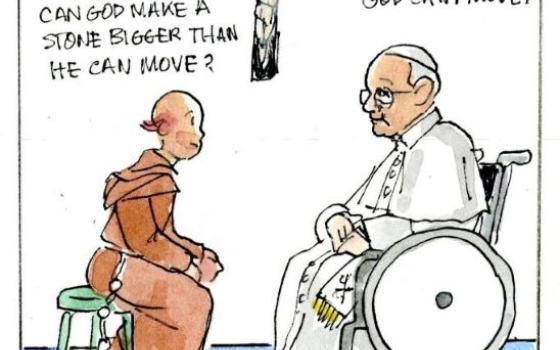The U.S. Capitol is seen during sunrise Jan. 6, 2022, the first anniversary of the attack on the U.S. Capitol by supporters of former President Donald Trump. (CNS photo/Tom Brenner, Reuters)
Support for political violence and concern over the state of American democracy are both on the rise, with 75% of Americans believing the future of democracy is at risk in the next presidential election, according to a report released Oct. 25 by the Public Religion Research Institute and the Brookings Institution.
For the first time this year, support for political violence has peaked above 20%, with 23% of Americans believing "true American patriots may have to resort to violence to save the country," versus 15% in 2021.
One-third of white evangelical Protestants support the idea, significantly more than any other religious group.
The findings appear in the 14th edition of PRRI’s annual American Values Survey, in which 2,525 American adults were asked their views on economic and cultural issues ahead of the 2024 election.
Americans who believe the 2020 election was stolen from Donald Trump are more likely to support the use of political violence than those who don't think so (46% versus 13%). Among those who believe in the replacement conspiracy theory, which holds that immigrants or Jews are coming to the United States to dilute white Americans' cultural dominance, 41% support using political violence.
According to the survey, 38% of Americans believe the country needs an authoritarian figure to put the country back on the right track. Hispanic Catholics support this idea far more than any other religious groups, with 51% agreeing with the statement, "Because things have gotten so far off track in this country, we need a leader who is willing to break some rules if that's what it takes to set things right." Black Protestants, at 35%, are the least likely to agree.
At a panel discussion organized by the Brookings Institution on Wednesday, Lilliana Mason, associate professor of political science at Johns Hopkins University's Stavros Niarchos Foundation Agora Institute, noted that the findings could be the consequence of each party viewing their political opponents as more violent. "It is important to remember that these numbers can also be context-dependent," said Mason.
Advertisement
The survey also delves into Americans' adhesion to white Christian nationalist ideology. According to 33% of Americans, God gave America to European Christians as a promised land where they could create an exemplary society. More than half of white evangelical Protestants agree with this statement; 77% believe the founders intended to create a Christian nation.
Americans who believed God wanted the U.S. to be a promised land for European Christians in turn are more likely (39%) to support the use of political violence to save the country than those who disagree (16%).
For 55% of Americans, American culture has changed for the worse since the 1950s. White Christians believe it is the case more than any other religious groups: 77% of white evangelical Protestants, 60% of white mainline or nonevangelical Protestants and 57% of white Catholics think American culture has changed for the worse since the 1950s.
Joy Reid, an MSNBC host and political analyst who participated in the panel discussion, said the increasing support for political violence results from competing visions of American society. Many voters' main concerns are cultural issues that can't be solved politically. "People do not have confidence in democracy as a way to solve their fundamental concerns," said Reid.
"What's so striking here is we're having elections in two different countries," said Eugene J. Dionne, chair and senior fellow at the Brookings Institution, referring to the two parts of a divided U.S.
The survey also examined America’s main concerns out of 20 political issues, including immigration, racial inequality, LGBTQ rights and school curriculums. For 62% of Americans, the increasing cost of housing and everyday expenses is a critical issue, followed by crime and health care.
The survey was conducted between Aug. 25-30 and has a margin error of 2.19 percentage points. The confidence level is 95%.






